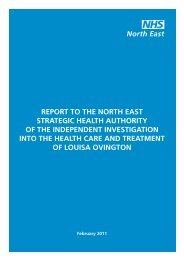REPORT OF AN INDEPENDENT INQUIRY ... - Hundred Families
REPORT OF AN INDEPENDENT INQUIRY ... - Hundred Families
REPORT OF AN INDEPENDENT INQUIRY ... - Hundred Families
Create successful ePaper yourself
Turn your PDF publications into a flip-book with our unique Google optimized e-Paper software.
Chapter 2 – The Onset of Chandran Sukumaran’s Illness<br />
1. Sulekha Jaykumar says her brother became unwell from about the age of 15 years. Biju<br />
Ramkrishnan explained that he began to talk “about God and just unusual things, which I knew<br />
wasn’t the Chandran I knew”. Chandran described himself as “becoming very hyperactive” and<br />
“talking too much”. As far as we could ascertain, his family arranged for him to go to India where<br />
he was admitted to hospital in the late 1980s, because he was unwell. Little is known about this<br />
admission. We have seen no records from the hospital and the family members to whom we<br />
spoke knew few details since they were not directly involved. His sister told us that he came to<br />
her crying and saying he had lost his life and that, because of the way he was talking and acting,<br />
a decision was taken (largely, it seems, by her husband) to have him admitted. It is her<br />
understanding that whilst he was an inpatient Chandran was given electro-convulsive therapy<br />
and medication - but she did not know which. It is possible this was Lithium Carbonate, which<br />
is a name with which his family is familiar. Chandran said this was the medication prescribed.<br />
After a while, he appeared to the family to be better again and he insisted on returning to<br />
England. He says he decided to stop taking his medication. For a short while, it seems that his<br />
relationship with his father improved.<br />
Comment<br />
Chandran’s first presentation with symptoms of severe and enduring mental health<br />
problems was when he was about 15 years old. This is a very young age for the onset of such<br />
problems. His symptoms were sufficiently severe for his family subsequently to have<br />
arranged for his admission to hospital in India where he received ECT. Yet we found no<br />
evidence that the earliness of the onset of the disorder featured conspicuously in the<br />
assessment and management of his illness and his prognosis.<br />
2. The first record of Chandran seeking medical help in this country for mental health problems is<br />
on 17th April 1990 (he was then 20 years old) when, according to his medical records, he went<br />
to his then GP, Dr Alagrajah, saying that “some one did evil for me”. He talked of wanting to<br />
take revenge on the “family at 32 Hall” who had given him some medication to kill him, and said<br />
that he was hearing voices at times. We have been unable to find out whether this was a reference<br />
by Chandran to a real family; it is possible he was intending to refer to the Ramkrishnans. On<br />
23rd April 1990, Dr Alagrajah referred him to the London Independent Hospital for a psychiatric<br />
assessment where he was seen by a Dr Orton on 26th April 1990. Dr Orton wrote to Dr Alagrajah<br />
saying that Chandran:<br />
“has either a manic illness, or an early psychosis. He has grandiose ideas of being able to<br />
control rainfall, and having a mission to save the poor people of Ethiopia, and talks of hearing<br />
“voices” but it is not clear whether these are true hallucinations.<br />
What is clear is that he requires sedation, and assessment over a period of time. He has no<br />
insight, but from his own and his father’s account does not present a threat to himself or<br />
others and so admission under a Section of the Mental Health Act is not appropriate<br />
at present.<br />
17

















